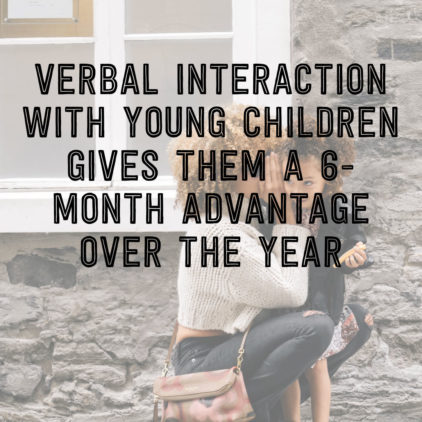Big change happens when you address the root of a big problem.
Child development in the early years is one of our focus areas because by the time a child reaches five years old, 85% of his or her brain has already developed.
Therefore, a child’s life is already partially determined before they even walk through the school gate.
The interactions a child has in those first few years affect how they will learn, how they will make friends, and influences the trajectory of their whole life.

Children are learning from the moment they are born through observation and interaction, particularly play and speech.
Those who are not exposed to enough talking and play at home often lack the basic learning skills they need when they get to school. This puts them at an early disadvantage, which has a knock-on effect well into their future.
Income levels also play a role here. In 1995 Betty Hart and Todd R. Risley conducted a study, which found that by the age of three, children from higher income families hear 30 million more words than children in lower income families.
Hart and Risley assessed the same children again at nine years of age and found a very clear link between their academic success – the children with fewer words at age three had slow growth throughout their school years.
As well as early language and communication, skills such as self-control and concentration are crucial for success. Delays in learning these skills early often lead to painful and expensive problems later in life.
Early intervention is a concept that we are familiar with in other areas of life. It’s helpful to think of learning as similar to health – it’s easier and more cost effective to start good habits early compared to reversing unhealthy habits later.
This idea is supported by research that proves the need for positive investment in a child’s early years as it brings profound returns for decades.
Making early years learning EasyPeasy
Big Change project partner, EasyPeasy, understood this research but thought more practical things could be done to help every child get the best start in life, regardless of background.
They built a digital early years programme that engages and empowers parents with the knowledge they need. EasyPeasy lives up to its name by sending information and inspiration directly to where people are – via mobile phone app.
All of their content is based on learning through play – helping to give parents the confidence they need to support their child to develop the crucial early years.
EasyPeasy has also built digital tools to help early years teachers and nursery staff engage with parents. This means that the two most important early environments for a child – the home and the classroom – are working together to support growth and learning.
The programme promotes engagement in three key ways:
- Sending game ideas to parents with engaging videos that are easy to follow – every game helps to develop early skills based on the Early Years Foundation Stage
- Providing tips and prompts that provide useful information about child development
- Bringing families and early years teachers closer together, bridging learning in living room with learning in the classroom
EasyPeasy has already been independently evaluated in two rigorous, randomised control trials by the University of Oxford, that show the programme has high impact and impressive outcomes for the families they work with.
Big Change backs ideas in the early stage so that they have the opportunity to prove their models, secure more funding and grow. Supporting EasyPeasy will mean they can build on their success so far and help close the early years development gap for hundreds of thousands of families across the country.
Paying attention to what children need early on helps set them up for more successful futures – whatever that success might be for them. Engaging with children under five through play is proven to better prepare them for school with learning skills like communication, self-control and concentration.
TO HELP US SUPPORT MORE EARLY YEARS PROJECTS DONATE TO THE VIRGIN STRIVE CHALLENGE HERE.
